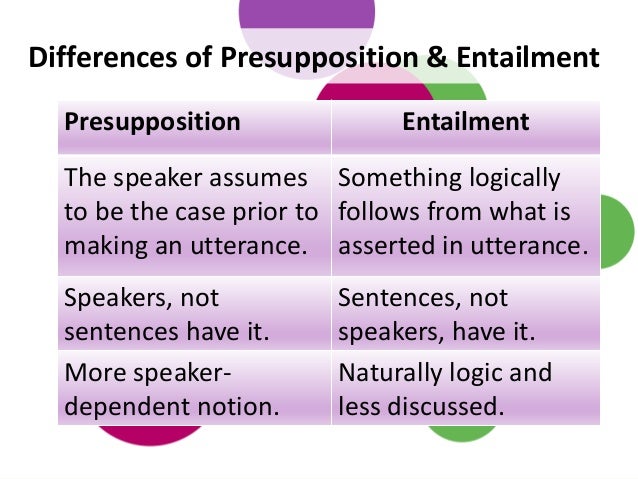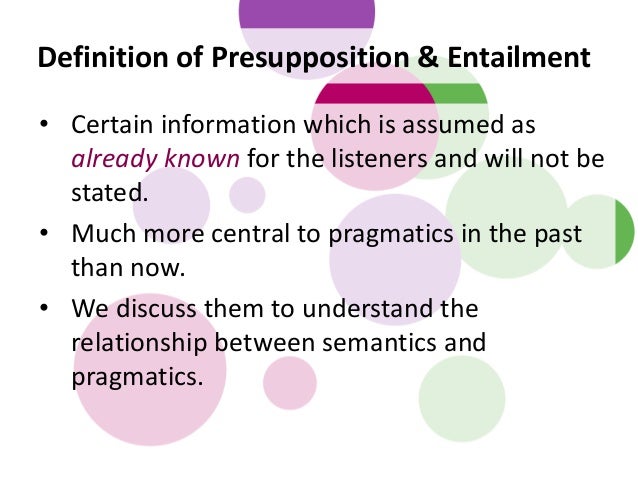Why Presupposition And Entailment Are More Central To Pragmatics
- Entailment is a relation between sentence meanings, or propositions. (Sometimes, speaking loosely, we talk as though it were a relation between sentences.) Presupposition can also be seen as a relation between propositions, although many linguists (including George Yule) prefer to see presupposition as strictly pragmatic, and a relation between.
- It is known as projection problem. Presupposition don’t ‘project’ is that they are destroyed by entailments. Entailment is something that necessarily follows from what is asserted. The entailment is simply more powerful than the presupposition. That’s why we call them potential presuppositions. The projection Problem, cont.
- Why Presupposition And Entailment Are More Central To Pragmatics Meaning
- Why Presupposition And Entailment Are More Central To Pragmatics Examples
- Why Presupposition And Entailment Are More Central To Pragmatics In English

For other uses, see.In the branch of linguistics known as, a presupposition (or PSP) is an about the world or background belief relating to an utterance whose truth is taken for granted in. Examples of presuppositions include:. Jane no longer writes fiction.
Pragmatics and presupposition appearing in them become presuppositions of the entire sentence, positions that do not let them, and positions that sometimes do and sometimes do not.3.
Presupposition: Jane once wrote fiction. Have you stopped eating meat?.

Presupposition: you had once eaten meat. Have you talked to Hans?.
Presupposition: Hans exists.A presupposition must be mutually known or assumed by the speaker and addressee for the utterance to be considered appropriate in context. It will generally remain a necessary assumption whether the utterance is placed in the form of an assertion, denial, or question, and can be associated with a specific or grammatical feature (presupposition trigger) in the utterance.Crucially, of an expression does not change its presuppositions: I want to do it again and I don't want to do it again both presuppose that the subject has done it already one or more times; My wife is pregnant and My wife is not pregnant both presuppose that the subject has a wife. In this respect, presupposition is distinguished from. For example, The president was assassinated entails that The president is dead, but if the expression is negated, the is not. Contents.Negation of a sentence containing a presupposition If presuppositions of a sentence are not consistent with the actual state of affairs, then one of two approaches can be taken. Given the sentences My wife is pregnant and My wife is not pregnant when one has no wife, then either:. Both the sentence and its negation are false; or.
Why Presupposition And Entailment Are More Central To Pragmatics Meaning
approach: Both 'my wife is pregnant' and 'my wife is not pregnant' use a wrong presupposition (i.e. That there exists a which can be described with the noun phrase my wife) and therefore can not be assigned.tries to solve this dilemma with two interpretations of the negated sentence:. 'There exists exactly one person, who is my wife and who is not pregnant'.
'There does not exist exactly one person, who is my wife and who is pregnant.' For the first phrase, Russell would claim that it is false, whereas the second would be true according to him.Projection of presuppositions A presupposition of a part of an utterance is sometimes also a presupposition of the whole utterance, and sometimes not.
For instance, the phrase my wife triggers the presupposition that I have a wife. The first sentence below carries that presupposition, even though the phrase occurs inside an embedded. In the second sentence, however, it does not. John might be mistaken about his belief that I have a wife, or he might be deliberately trying to misinform his audience, and this has an effect on the meaning of the second sentence, but, perhaps surprisingly, not on the first one. John thinks that my wife is beautiful.
John said that my wife is beautiful.Thus, this seems to be a property of the main verbs of the sentences, think and say, respectively. After work by, verbs that allow presuppositions to 'pass up' to the whole sentence ('project') are called holes, and verbs that block such passing up, or projection of presuppositions are called plugs. Some linguistic environments are intermediate between plugs and holes: They block some presuppositions and allow others to project. These are called filters. An example of such an environment are ('If-then' clauses). A conditional sentence contains an antecedent and a consequent.
Why Presupposition And Entailment Are More Central To Pragmatics Examples
The antecedent is the part preceded by the word 'if,' and the consequent is the part that is (or could be) preceded by 'then.' If the consequent contains a presupposition trigger, and the triggered presupposition is explicitly stated in the antecedent of the conditional, then the presupposition is blocked.
Otherwise, it is allowed to project up to the entire conditional. Here is an example:If I have a wife, then my wife is blonde.Here, the presupposition triggered by the expression my wife (that I have a wife) is blocked, because it is stated in the antecedent of the conditional: That sentence doesn't imply that I have a wife. In the following example, it is not stated in the antecedent, so it is allowed to project, i.e. The sentence does imply that I have a wife.If it's already 4am, then my wife is probably angry.Hence, conditional sentences act as filters for presuppositions that are triggered by expressions in their consequent.A significant amount of current work in and is devoted to a proper understanding of when and how presuppositions project.Presupposition triggers A presupposition trigger is a lexical item or linguistic construction which is responsible for the presupposition, and thus 'triggers' it. The following is a selection of presuppositional triggers following 's classic textbook on Pragmatics, which in turn draws on a list produced.
As is customary, the presuppositional triggers themselves are italicized, and the symbol » stands for 'presupposes'. Definite descriptions. Main article:Definite descriptions are phrases of the form 'the X' where X is a noun phrase. The description is said to be proper when the phrase applies to exactly one object, and conversely, it is said to be improper when either there exist more than one potential referents, as in 'the senator from Ohio', or none at all, as in 'the king of France'. In conventional speech, definite descriptions are implicitly assumed to be proper, hence such phrases trigger the presupposition that the referent is unique and existent.

John saw the man with two heads.»there exists a man with two heads.Factive verbs. See also:In Western epistemology, there is a tradition originating with of defining knowledge as justified true belief. On this definition, for someone to know X, it is required that X be true. A linguistic question thus arises regarding the usage of such phrases: does a person who states 'John knows X' implicitly claim the truth of X? Explored this question in a format in a 2007 book on language and cognition, using a widely publicized example from a speech by a U.S. A 2003 speech by George W.
Bush included the line, 'British Intelligence has learned that Saddam Hussein recently sought significant quantities of uranium from Africa.' Over the next few years, it became apparent that this intelligence lead was incorrect. But the way the speech was phrased, using a factive verb, implicitly framed the lead as truth rather than hypothesis. Karttunen, Lauri (1974). Theoretical Linguistics 1 181-94.
Also in Pragmatics: A Reader, Steven Davis (ed.), pages 406-415, Oxford University Press, 1991. Kadmon, Nirit. Formal pragmatics: semantics, pragmatics, presupposition, and focus. Great Britain: Wiley-Blackwell, 2001, page 10. Levinson, Stephen C. Pragmatics.Cambridge: Cambridge University Press, 1983, pp. 181-184.
(2007), Penguin Books,. Bush, George W., State of the Union Address, January 28th, 2003. Hazlett, A.
'The Myth of Factive Verbs'. Philosophy and Phenomenological Research. 80: 497. ^ Sedivy, Julie, and Carlson, Greg N.
Why Presupposition And Entailment Are More Central To Pragmatics In English
'Sold on Language: How Advertisers Talk to You and What This Says About You,' Wiley-Blackwell, pp. 104-105. Kripke, Saul (2009) 'Presupposition and Anaphora: Remarks on the Formulation of the Projection Problem,' Linguistic Inquiry, Vol. 3, Pages 367-386. ^'Critical discourse analysis (CDA) is a type of discourse analytical research that primarily studies the way social power abuse, dominance, and inequality are enacted, reproduced, and resisted by text and talk in the social and political context. With such dissident research, critical discourse analysts take explicit position, and thus want to understand, expose, and ultimately resist social inequality.' , ' 2009-02-06 at the ', chapter 18 in Deborah Schiffrin, Deborah Tannen and Heidi E.
Hamilton (eds.), (, 2003): pp. 352–371.Further reading. Van Benthem and A. Ter Meulen (eds.), The Handbook of Logic and Language, Elsevier, pp. 939–1008. In Ramchand, G. Reiss (eds.), Oxford University Press.